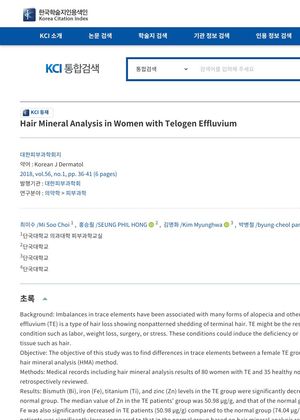Hair Mineral Analysis in Women with Telogen Effluvium
January 2018
in “
Journal of Clinical Dermatology
”

TLDR Women with Telogen Effluvium have lower levels of Zinc and Iron in their hair.
In 2018, a study was conducted to identify differences in trace elements between a group of 80 women with Telogen Effluvium (TE), a type of hair loss, and a control group of 35 healthy women. The study used a hair mineral analysis method and found that levels of Bismuth (Bi), Iron (Fe), Titanium (Ti), and Zinc (Zn) were significantly lower in the TE group compared to the control group. Specifically, the median value of Zn in the TE group was 50.98 μg/g, compared to 76.19 μg/g in the control group. Similarly, Fe was significantly lower in the TE group (50.98 μg/g) compared to the control group (74.04 μg/g). The study concluded that lower levels of Zn and Fe might be related to the hair loss process in women with TE.


